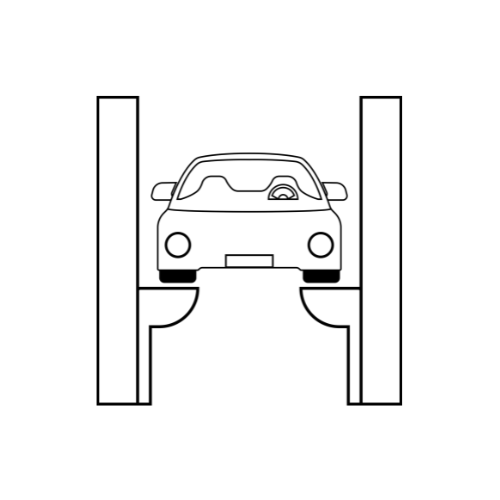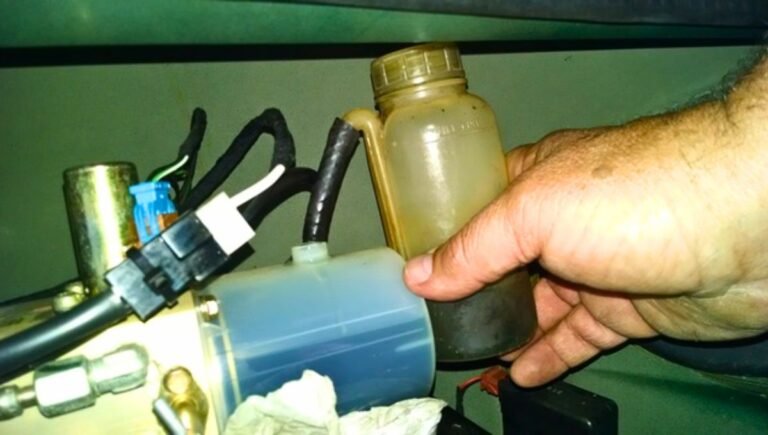Can I Use Hydraulic Oil for Power Steering? Expert Insights
No, hydraulic oil is not recommended for power steering systems. Power steering systems require specific fluids designed for them.
Power steering systems are crucial for smooth and effortless vehicle handling. The fluid used in these systems plays a vital role in maintaining optimal performance and longevity. Using the incorrect type of fluid, such as hydraulic oil, can lead to significant issues, including damage to seals, hoses, and internal components.
Power steering fluids are specifically formulated to meet the unique demands of these systems, ensuring proper lubrication, pressure, and heat resistance. Always refer to your vehicle’s manual for the recommended power steering fluid to ensure the best performance and avoid costly repairs. Proper maintenance and using the correct fluid can extend the life of your power steering system.
Introduction To Power Steering Fluids
Power steering fluids are essential for a smooth driving experience. They help in the easy turning of the steering wheel. Without the right fluid, steering becomes hard and noisy. Choosing the correct fluid ensures the longevity of your power steering system.

The Role Of Fluid In Power Steering
Power steering fluid reduces friction in the steering system. It lubricates the moving parts and prevents wear and tear. This fluid also helps in transferring power to the steering system. It makes turning the wheel easier and more responsive.
Using the wrong fluid can damage your steering system. It may cause leaks, noises, and even total failure. Always use the recommended fluid for your vehicle.
Characteristics Of Standard Power Steering Fluid
Standard power steering fluid has specific characteristics. It is designed to work under high pressure and temperature. Below is a table showing the key characteristics:
| Characteristic | Description |
|---|---|
| Viscosity | Thick enough to lubricate, but not too thick. |
| Anti-wear properties | Prevents wear on the moving parts. |
| Anti-foaming | Does not foam under pressure. |
| Temperature Stability | Works well in both cold and hot conditions. |
These characteristics ensure the fluid performs optimally. It helps in maintaining a smooth and quiet steering experience. Always check your car’s manual for the recommended type of fluid.
The Basics Of Hydraulic Oil
Hydraulic oil is essential for many machines. It transfers power in hydraulic systems. This oil also lubricates parts, reducing wear and tear. Understanding hydraulic oil helps in choosing the right one for your needs.
Composition Of Hydraulic Oil
Hydraulic oil contains base oil and additives. The base oil can be mineral or synthetic. Additives improve performance and protect components. Common additives include anti-wear agents, rust inhibitors, and anti-foaming agents.
Common Uses For Hydraulic Oil
Hydraulic oil is used in various machines. Below is a table showing some common uses:
| Application | Description |
|---|---|
| Construction Equipment | Excavators, bulldozers, and cranes |
| Industrial Machinery | Presses, lifts, and conveyors |
| Automotive Systems | Brakes, transmissions, and power steering |
Hydraulic oil is vital in these applications. It ensures smooth and efficient operation.
Hydraulic Oil Vs. Power Steering Fluid
Car enthusiasts often ask: Can I use hydraulic oil for power steering? Both fluids are essential for smooth vehicle operation. They may seem similar but have distinct differences. This section explores the differences between hydraulic oil and power steering fluid.

Viscosity Comparisons
Viscosity is crucial in determining fluid efficiency. Hydraulic oil typically has a higher viscosity. This means it is thicker and flows slower. Power steering fluid has a lower viscosity, making it thinner and faster-flowing. The difference impacts system performance and efficiency.
| Fluid Type | Viscosity Range |
|---|---|
| Hydraulic Oil | 22-68 cSt |
| Power Steering Fluid | 8-18 cSt |
Chemical Properties And Performance
The chemical properties of these fluids also differ. Hydraulic oil is designed for high-pressure environments. It contains additives to prevent wear and tear. Power steering fluid includes additives for temperature stability. It also has anti-foaming agents.
Hydraulic oil can withstand higher temperatures. But it may not provide the same level of performance in a power steering system. Power steering fluid is optimized for lower pressure and smoother operation. Using the wrong fluid may lead to poor performance or damage.
- Hydraulic oil: High pressure, higher temperature tolerance.
- Power steering fluid: Low pressure, temperature stability, anti-foaming.
Understanding these differences ensures the best performance for your vehicle. Always use the recommended fluid to avoid issues.
Expert Opinions On Fluid Interchangeability
When considering whether to use hydraulic oil for power steering, expert opinions vary. This section delves into insights from mechanics and manufacturers.
Mechanic Insights
Mechanics generally advise against using hydraulic oil for power steering. Power steering systems have specific fluid requirements. Incorrect fluid can damage the system.
Hydraulic oil may not have the necessary additives for power steering. These additives prevent wear and tear in the system. Mechanics stress the importance of using the right fluid. This maintains optimal performance and extends the system’s life.
Manufacturer Recommendations
Manufacturers provide clear guidelines on the type of fluid to use. Always check the owner’s manual for recommendations. Using the specified fluid ensures the system works correctly.
Most manufacturers design their power steering systems with specific fluids in mind. These fluids have the right properties to support the system. Using hydraulic oil instead can void warranties and cause damage.
Below is a table summarizing manufacturer recommendations:
| Manufacturer | Recommended Fluid | Reason |
|---|---|---|
| Ford | Mercon V | Optimized for power steering systems |
| GM | Dexron III | Prevents wear and tear |
| Toyota | ATF Type T-IV | Ensures smooth operation |
By following these guidelines, you can avoid potential issues. Always use the correct fluid for your power steering system.
Risks Of Using Hydraulic Oil In Power Steering
Using hydraulic oil in power steering systems poses significant risks. These risks can lead to costly repairs and unsafe driving conditions. It’s crucial to understand these risks before making any changes to your power steering fluid.

Potential Damage To Components
Hydraulic oil can damage the power steering system components. It lacks the specific additives found in power steering fluid. These additives protect seals, hoses, and other parts.
Without these additives, seals can deteriorate quickly. This can cause leaks, leading to a loss of steering fluid. Leaks can cause steering to become stiff and unresponsive.
Hoses may also swell or crack under the wrong fluid pressure. This can result in a sudden failure of the power steering system. Replacing these damaged components can be very costly.
Impact On Steering Performance
Using the wrong fluid can affect steering performance. Hydraulic oil can make steering less responsive. This can be dangerous, especially at high speeds.
The viscosity of hydraulic oil is different from power steering fluid. This can cause the steering system to work harder. Over time, this extra effort can lead to wear and tear on the steering pump.
A less responsive steering system can make driving difficult. It can also increase the risk of accidents. Always use the recommended power steering fluid for optimal performance.
| Issue | Hydraulic Oil | Power Steering Fluid |
|---|---|---|
| Protects Seals | No | Yes |
| Maintains Viscosity | No | Yes |
| Prevents Wear | No | Yes |
When You Might Consider Hydraulic Oil?
Using hydraulic oil for power steering is not common practice. Yet, there are situations where it might be considered. This section will explore those scenarios. Understanding these specific cases can help in making informed decisions.
Emergency Situations
Imagine you are in an emergency and have no power steering fluid. In such cases, hydraulic oil might be a temporary solution. Hydraulic oil can provide the necessary lubrication to keep the steering system functional. It ensures you can still steer the vehicle safely.
Be cautious when using hydraulic oil in emergencies. It is not designed for power steering systems. Prolonged use can cause damage. Always replace it with the correct fluid as soon as possible.
Older Vehicle Considerations
Older vehicles might not have specific fluid requirements. Some older models can tolerate different types of fluids. If you have an older car, check the manual. It may allow the use of hydraulic oil in the power steering system.
Older vehicles often have simpler power steering systems. This makes them more adaptable to different types of fluids. Consult a mechanic to ensure it is safe for your vehicle.
If you use hydraulic oil, monitor the system closely. Look for any signs of leaks or malfunctions. Regular checks will help prevent long-term damage.
Proper Power Steering Maintenance
Proper power steering maintenance ensures your car runs smoothly. It prevents unexpected breakdowns. This guide focuses on checking fluid levels and knowing when to replace power steering fluid.

Checking Fluid Levels
Regularly checking fluid levels is essential. It keeps your power steering system in top shape. Here are the steps to follow:
- Locate the power steering reservoir. It is usually near the engine.
- Remove the cap and check the fluid level. Look for the “Full” and “Add” marks.
- If the fluid is low, add the recommended fluid type. Avoid overfilling.
When To Replace Power Steering Fluid
Replacing power steering fluid prevents system failures. Follow these signs to know when it’s time:
- The fluid is dark or dirty.
- Strange noises from the steering wheel.
- Difficulty in steering.
- Fluid leaks under your vehicle.
Check your owner’s manual for the recommended schedule. Typically, replace the fluid every 50,000 miles.
Use a table for quick reference on fluid types:
| Vehicle Make | Recommended Fluid Type |
|---|---|
| Ford | Mercon V |
| Chevrolet | Dexron III |
| Toyota | Type T-IV |
Maintaining proper power steering fluid levels ensures smooth steering. It also extends the life of your vehicle’s power steering system.
Alternatives To Hydraulic Oil For Power Steering
Many drivers wonder about using hydraulic oil for power steering. It’s essential to explore various alternatives. Choosing the right fluid ensures your car’s power steering system works smoothly.
Synthetic Vs. Mineral Power Steering Fluids
Synthetic power steering fluids offer better performance. They can handle extreme temperatures and provide longer-lasting protection. Mineral power steering fluids, on the other hand, are cheaper. They are derived from natural resources and work well for older cars. Below is a table comparing synthetic and mineral power steering fluids:
| Type | Advantages | Disadvantages |
|---|---|---|
| Synthetic | High performance, durable, and efficient | More expensive |
| Mineral | Cost-effective and good for older cars | Less efficient in extreme conditions |
Aftermarket Fluid Additives
Aftermarket fluid additives can enhance the performance of your power steering system. These additives can improve lubrication, reduce wear, and increase fluid life. Below are some benefits of using aftermarket fluid additives:
- Improve lubrication
- Reduce system wear
- Extend fluid life
It’s important to choose the right additive for your vehicle. Always check the manufacturer’s recommendations before adding any aftermarket products.
Can Hydraulic Oil Be Used In Power Steering?
Using hydraulic oil in power steering is not recommended. Power steering systems require specific fluids. Using the wrong fluid can cause damage.
What Happens If I Use Hydraulic Oil In Power Steering?
Using hydraulic oil can lead to system failure. It can cause leaks, seal damage, and reduced performance. Always use the recommended fluid.
Is Hydraulic Oil And Power Steering Fluid The Same?
No, they are different. Hydraulic oil and power steering fluid have different properties. Using the correct fluid ensures optimal performance.
Can Mixing Hydraulic Oil And Power Steering Fluid Cause Issues?
Yes, mixing fluids can cause issues. It can lead to system damage and poor performance. Always use the specified fluid for your vehicle.
Conclusion
Using hydraulic oil for power steering is not recommended. It can cause damage and affect performance. Always use the fluid specified by your vehicle manufacturer. Proper maintenance ensures safety and longevity of your steering system. Stick to the guidelines for a smooth and efficient driving experience.






